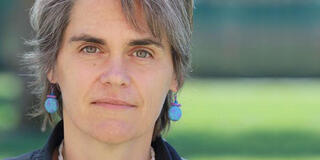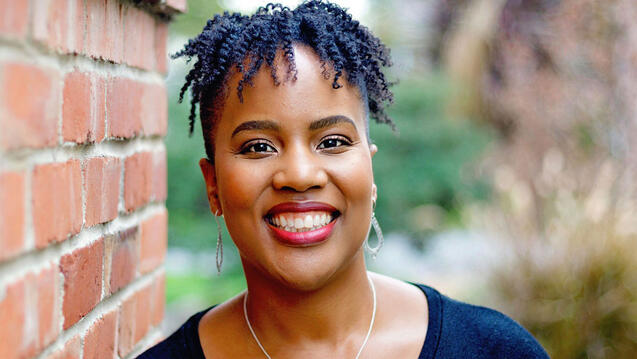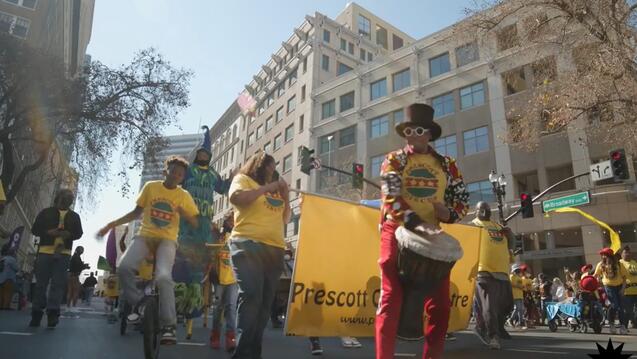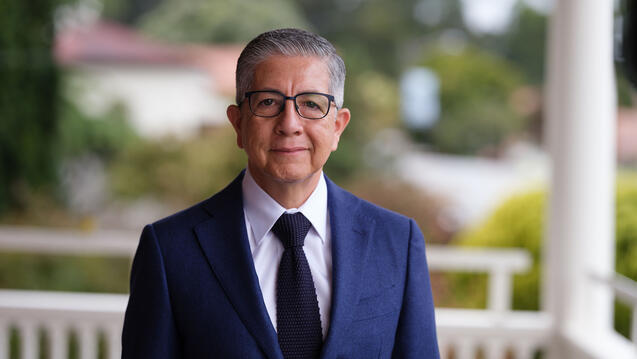Excellent Sex, Ethics, and the Lives of Saints

Can ethics help you have excellent sex?
Lisa Fullam says they can.
She will explain how in a lecture series on virtue ethics, sex, and the lives of saints, which kicks off July 8 at USF’s Hilltop campus.
Fullam, who teaches moral theology at Santa Clara’s Jesuit School of Theology in Berkeley, is this summer’s scholar-in-residence at USF’s Joan and Ralph Lane Center for Catholic Studies and Social Thought.
Lane Center Scholar-in-Residence Lecture Series
July 8 – Becoming Excellent: Reclaiming Virtue Ethics for Our Times
July 15 – Excellent Sex: Applying Virtue Ethics for Sexual Ethics
July 22 – Reclaiming Virtues: Humility in St. Teresa of Avila and Ignatius of Loyola
All events take place 5 p.m. to 6:30 p.m. in Lone Mountain 100.
She gave USF News a taste of what’s to come, explaining what’s wrong with the way we think about ethics and what we can learn from the fearless St. Ignatius.
Excellent Sex is a pretty provocative lecture title. What does it mean?
Excellent Sex is kind of an insider-joke in virtue ethics. To live virtuously is to live in accordance with our human nature. To flourish, in this sense, is not a matter of suppressing our natural drives and appetites but developing them.
In much of Christian tradition, sex has been regarded with suspicion, and our sex drive as something that needs strict control. Instead of the usual “don’t do this” or “don’t do that,” I want to ask: How do we flourish in our sex lives? How do sexual relationships enhance life overall, body, mind, and spirit? It’s an approach that considers our sexual relationships not only in terms of what happens in the bedroom, but in terms that engage self-care and questions of relationships and their flourishing, and also asks how we approach questions of sexual justice that shape public policy.
What inspired you to develop this specific series on ethics in the modern world?
Virtue ethics starts with the idea that virtues are natural to us and is especially appropriate at a time when we don’t necessarily believe in traditional sources of authority automatically. In this series, I hope to explore how we can reread tradition in a way that is fruitful for our lives now.
What do you mean by "reclaiming" virtue ethics? How and when did we lose it?
Moral theology as a discipline has been shaped by an unfortunate fixation on sin, and we have lost sight of our larger calling to be the best people we can be.
Virtue ethics invites us to engage different ways of thinking, by discovering the truth about ourselves, not by imposing our ideas on others. A simple example: If I wanted to help someone see that eating a healthy diet is better than subsisting on fried chicken and French fries, I could do it by trying to impose rules: “No French fries until you eat ALL your broccoli!” That might work with a 3 year old. But I could also say, “Don’t just listen to me, try it for 6 weeks! You’ll feel it yourself.”
Ethics then become a process of invitation and discovery, not finger-wagging.
How can people incorporate virtue ethics into their daily lives?
Aristotle said "We become builders ... by building, and we become harpists by playing the harp. Similarly, then, we become just by doing just actions, temperate by doing temperate actions, brave by doing brave actions." In an ethics of virtue, then, who we take as our role models becomes very important — they are people whose acts we reflect on and imitate in order to become virtuous ourselves.
A musician starts by practicing boring scales, then by imitating a great player, then by becoming the best musician he can be himself. This is virtue ethics — reflective practice makes perfect, and that perfection is individual.
What can we learn from saints like St. Ignatius and St. Teresa of Avila [mystic and Carmelite nun]?
First and foremost, both of them are fun people. Teresa had a wicked sense of humor, and Ignatius was a “full-speed ahead” kind of guy. They were also utterly fearless in their spiritual lives and challenge us to fearlessness too — to listen to where and how God is calling us and respond whole-heartedly. Each had uncomfortable relationships with ecclesial authority at various points in their lives, a situation many of us can relate to as well.
Know someone with a powerful USF story? Let us know! usfnews@usfca.edu | Twitter @usfcanews


